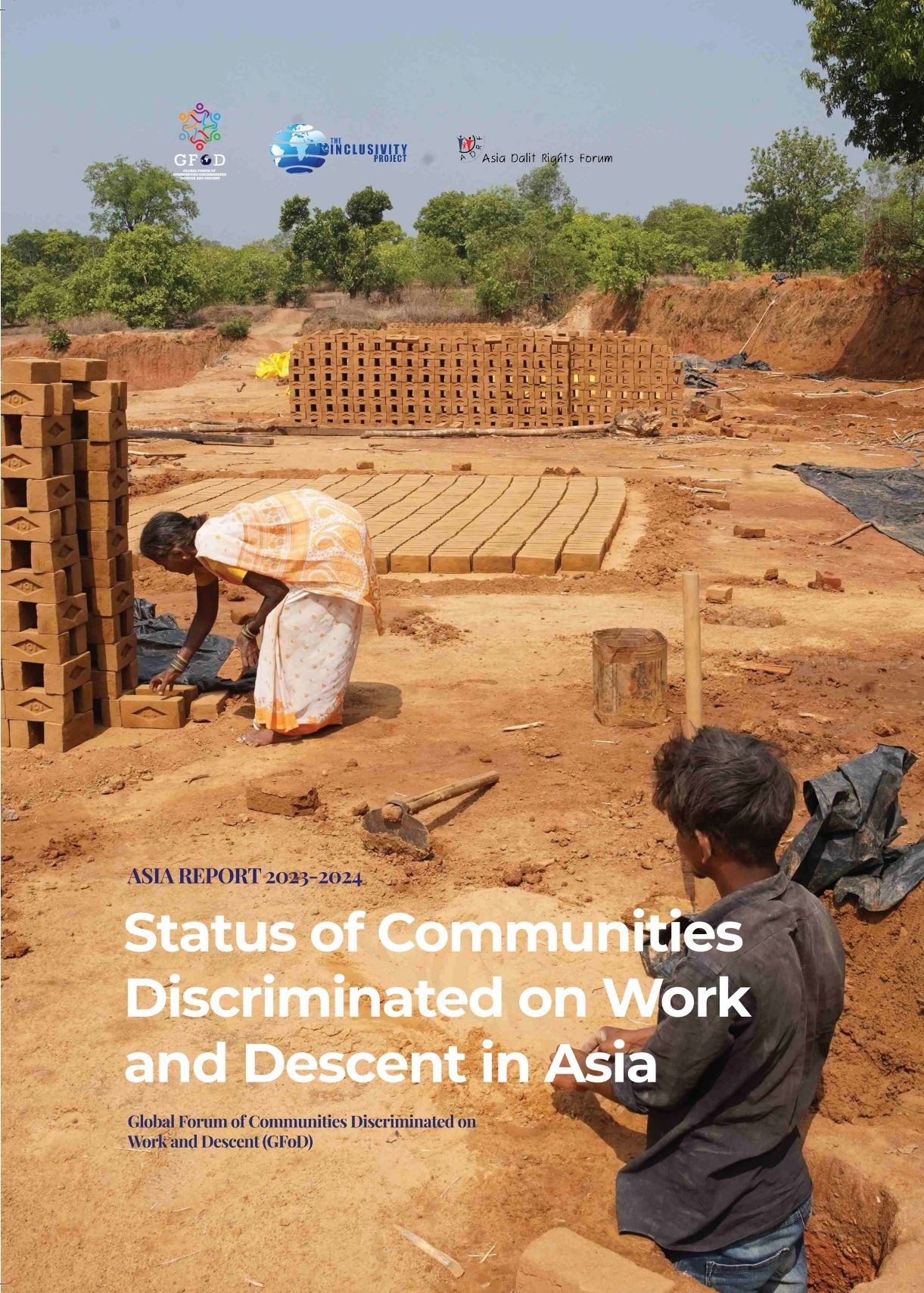Landmark report unveils challenges Faced by Asia-based CDWDs, proposes extensive policy changes
The Global Forum of Communities Discriminated on Work and Descent, in association with The Inclusivity Project released the ‘Status of Communities Discriminated on Work and Descent in Asia', a comprehensive report that documents the challenges faced by millions of CDWDs in India but also offers recommendations to policymakers to ensure redressal of the concerns.
The report, whose lead author is Deepak S. Nikarthil, makes an effort to “consolidate all the detailed information, analysis, and viewpoints currently available on the rights and entitlements of Communities Discriminated on Work and Descent (CDWD).” “The complex panorama of socio-economic, civil, political and cultural rights pertaining to CDWDs in Asia, particularly the southern part of the continents, is explored in this status report. Be it Dalits, also known as “Scheduled Castes,” “Untouchables,” or “Harijans,” in South Asia or Burakumins in Japan, CDWDs are a historically oppressed and disenfranchised group that has long endured systemic prejudice, social marginalisation, and economic exploitation. This report highlights the ongoing issues, achievements, and gaps in defending the rights and dignity of CDWDs throughout the area,” the author adds.
Read the full report below:
Nikarthil notes that in recent years, significant efforts have been made at local, national, and international levels to address CDWD rights violations. Affirmative action laws, awareness initiatives, and legal frameworks have all been crucial in promoting change. However, implementation flaws, societal biases, and enduring structural disparities still prevent true progress from being made.
“Throughout this report, we acknowledge the resilience and agency demonstrated by these marginalised communities as they challenge systemic discrimination and strive for their rights. Grassroots movements, civil society organisations, and international solidarity play a pivotal role in amplifying their voices and advocating for justice,” Nikarthil adds.
Asia has the largest number of DWD communities globally. The Asian continent accounts for more than three-quarters of the total number of Communities Discriminated on Work and Descent (CDWD) in the world. CDWD communities are known as Dalits in the region, primarily due to the high representation of Dalits in the region. Out of 300 million CDWD worldwide, 220 million are Dalits from South Asia
Three significant areas within Asia that could be termed hubs of DWD communities are South Asia and Malaysia (Dalits); Japan (Buraku); and Yemen (Muhamasheen).
| Country | Name | Population | Occupation |
| Bangladesh | Harijan/Dalits | 5.5 million | Sweepers and cleaners of private and public toilets, drainage, and other dirty places. |
| India | SC/Dalits | 201 million | Sweepers, cleaners, manual scavengers, and all other menial or indecent jobs |
| Japan | Burakumin | 2.5 million | Butchers, Leatherwork |
| Pakistan | SC/Dalits | 0.85 million | Sweepers, cleaners, barbers, washing communities, etc |
| Malaysia | Dalit Diaspora | 1.2 million | Plantation workers, manual laborers |
| Nepal | Dalits | 3.5 million | Sweepers, cleaners, manual scavengers, and all other menial or indecent jobs |
| Sri Lanka | Plantation workers/ Rodiya | 1.5 million | Plantation Workers, removing dead animals, and other menial jobs |
| Yemen | Muhammasheen | 1-3 million | Cleaning jobs, begging, collecting waste and plastic |
The objectives of the report include understanding the status Of Communities Discriminated on Work and Descent in Asia, including their socio-economic status within their countries and the discrimination faced from the lens of purity and pollution. It also explores the national mechanisms available for the protection, promotion, and safeguarding the rights of communities from exclusion and discrimination within each country and make the issues of CDWD more apparent to everyone and showcase the various interventions needed to address such a simple but complex issue.
The key recommendations are:
1. Adopt the “Draft Principles and Guidelines for the Effective Elimination of Discrimination Based on Work and Descent.”
2. Formally recognize and acknowledge the existence of discrimination based on work and descent (DWD) at the national, Asian , and global levels, considering the continuing relevance of ancestry and occupation to practices of modern slavery and caste. This should lead to meaningful policymaking that reaches affected communities.
3. Include DWD as a critical exclusion factor and take constructive steps for their human rights safeguards, development, peace, and justice across Asia and other regions globally.
4. States shall take all necessary constitutional, legislative, administrative, judicial, educational, and social measures to eliminate discrimination based on work and descent. This includes respecting, protecting, promoting, restituting, implementing, and monitoring the human rights of those facing these forms of discrimination, with robust disaggregated data collection in line with data protection and privacy principles.
5. Collaborate with National Human Rights Institutions, civil society organisations, and human rights defenders from DWD communities to combat prejudicial beliefs and practices. This includes addressing notions of untouchability, pollution, caste superiority, or inferiority, and preventing human rights violations based on these beliefs.
6. Form a working group on DWD at the regional level, including members of DWD communities, to conduct an extensive regional study on issues and challenges faced by CDWD. This study aims to develop strategies for further addressing these challenges.
7. Ensure adequate budgetary allocations across all levels of the federal government and at the state level for the implementation of protection and welfare measures for CDWD. Allocate specific funds for awareness-raising campaigns aimed at combating discrimination and prejudice.



Wow, awesome weblog format! How lengthy have you ever been running a blog for?
you make blogging glance easy. The full glance of your site is wonderful, as well as the content!
You can see similar: sklep online and here najlepszy sklep
Also visit my page sklep
Thank you very much. We have been working on this since past few months and trying to ensure that all material related to Communities Discriminated on Work and Descent from across the globe are available on our website.